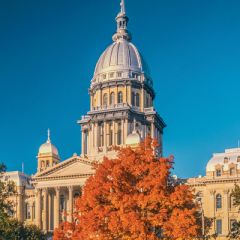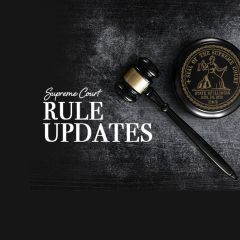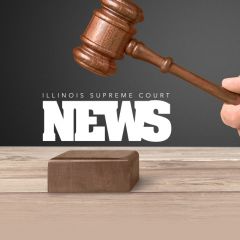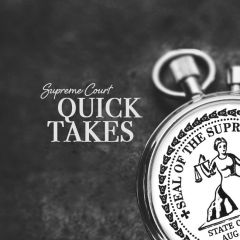Child custody laws, driving with cannabis in one’s system, probating wills and estates—state laws addressing these and many other matters are often crafted with feedback from the ISBA, whose members have a seat at the legislative table because of their ISBA section involvement and the Association’s legislative affairs program. It is often said that the Association’s dozens of sections (and its special committees and task forces) represent its beating heart. Most of the ISBA’s networking, continuing legal education, and legislative involvement take place through these specialized groups. The October Illinois Bar Journal devotes its cover story to the tactics and strategies of the ISBA’s rigorous, hands-on legislative affairs program in which ISBA members are given an opportunity to shape the bills that often end up on the governor’s desk.
Practice News
-
October 5, 2020 | Practice News

-
October 1, 2020 |
Practice News
Self-represented litigants in the Illinois Appellate Court face many unique challenges without adequate resources to help them through the appeals process. A new pro bono opportunity, Illinois Free Legal Answers for Civil Appeals, is now providing them with more legal assistance. Illinois Free Legal Answers for Civil Appeals was developed in partnership with the Administrative Office of the Illinois Courts, Illinois Supreme Court Commission on Access to Justice, the American Bar Association and the Public Interest Law Initiative (PILI).
-
September 30, 2020 | Practice News

The Illinois Supreme Court today amended Rules 212, 306, 315, 316, 318, 341, 368, and 705.
The changes go into effect October 1.
-
September 28, 2020 | Practice News

In “Public Records Shortcuts,” the title of Jesse Bowman’s Finding Illinois Law column in the September issue of the Illinois Bar Journal, Bowman, associate law librarian for technology initiatives and instruction at Northwestern Pritzker School of Law’s Pritzker Legal Research Center, summarizes two free internet tools that can be used to search more than 70,000 public databases on the internet. Bowman compares these two services (Search Systems and BRB Publications), demonstrates how they work, and lists their pros and cons. Similar, more powerful search tools are available for a price, Bowman notes. But why not take these free services for a test run and see what they can do?
-
September 25, 2020 | Practice News

The Illinois Supreme Court and Administrative Office of the Illinois Courts (AOIC) today announced the hiring of Deanie Brown as the Chief Diversity & Inclusion Officer (CDIO), a senior level position reporting to the AOIC Director. Her first day will be November 2, 2020.
-
September 25, 2020 | Practice News

The Illinois Supreme Court handed down nine opinions on Thursday, September 24. In People v. Stoecker, the Court affirmed the dismissal of a defendant’s petition for relief from judgment. In People v. Hollahan, the Supreme Court ruled that there was no error in a circuit court allowing a jury to watch a video of the defendant’s DUI stop in the courtroom with the defendant present. In People v. Gaines, the Court considered whether a trial court’s sua sponte vacatur of a defendant’s guilty plea and his subsequent trial violated double jeopardy. In People v. Deleon, the Court considered whether section 112a-11.5 of the Code of Criminal Procedure of 1963 which permits the issuance of a protective order in a crime involving domestic violence, a sexual offense, or stalking, is unconstitutional on its face and as applied to a defendant. In United States v. Glispie, the Supreme Court answered a certified question by the Seventh Circuit, holding that the limited authority doctrine applies to residential burglary by entry.
-
September 24, 2020 | Practice News

Project ECHO, an Appalachian/Midwest Regional Judicial Opioid Initiative (RJOI) program, has officially kicked off in Illinois. Project ECHO provides education on issues including the physiology of addiction, evidence-based programming interventions, and medication assisted treatment to Illinois judges in order to help judges address opioid abuse in criminal and family court cases.
-
September 21, 2020 |
Practice News
The Illinois Supreme Court announced the filing of lawyer disciplinary orders on September 21, 2020. Sanctions were imposed because the lawyers engaged in professional misconduct by violating state ethics law.
-
September 21, 2020 | Practice News

Ordinarily, an estate is taxed based on the value of its assets as of the decedent’s date of death. But for federal estate tax purposes, an alternate valuation date could be selected if it results in both the gross estate and the estate tax being reduced. The alternate valuation date is the date six months after the date of death. Utilizing the alternate valuation date would thus necessitate the filing of a federal estate tax return. In his September Illinois Bar Journal article, “COVID-19, Death, and Taxes,” Richard Hirschtritt discusses whether an Illinois resident who owns publicly traded stock, commercial real estate with an Illinois situs, and/or a business that has been adversely affected by the COVID-19 pandemic and has died within six months prior to the onset of the COVID-19 outbreak is subject to state or federal estate taxes.
-
September 15, 2020 |
Practice News
PILI will grant $312,000 to fund 60 law student interns at 30 public interest law organizations across Illinois during the 2020-21 academic year and the summer of 2021.
PILI’s Law Student Internship Program connects law students from across the country with public interest law agencies in Illinois and pays them for their work. Typically, Interns receive $6,000 for working 400 hours during the summer and $3,000 for working 200 hours over a semester. Interns can also receive law school credit for their Internship if first approved by both the student’s law school and agency.

